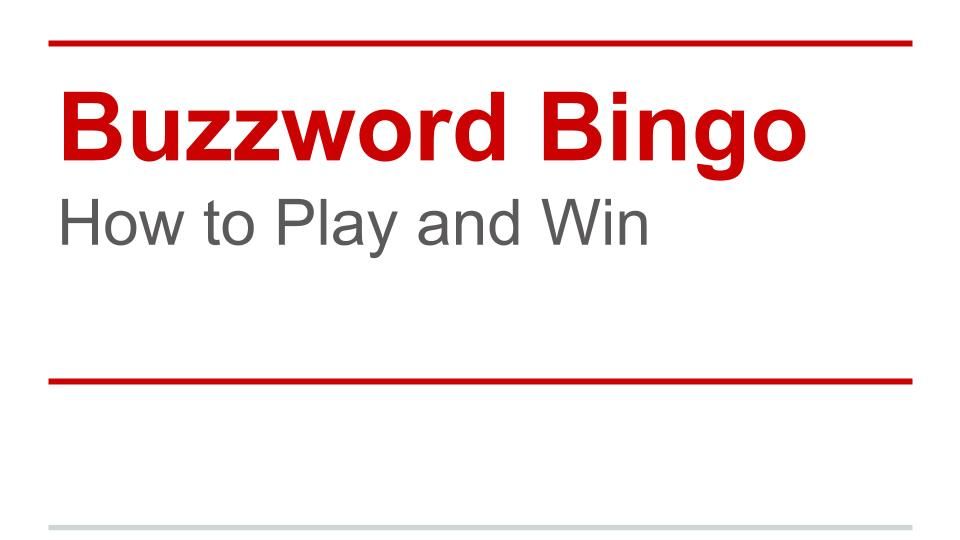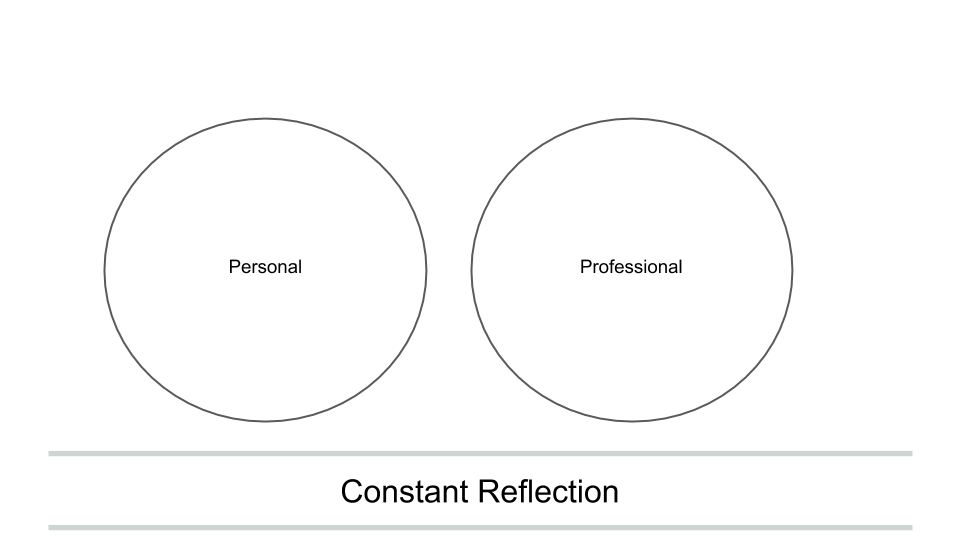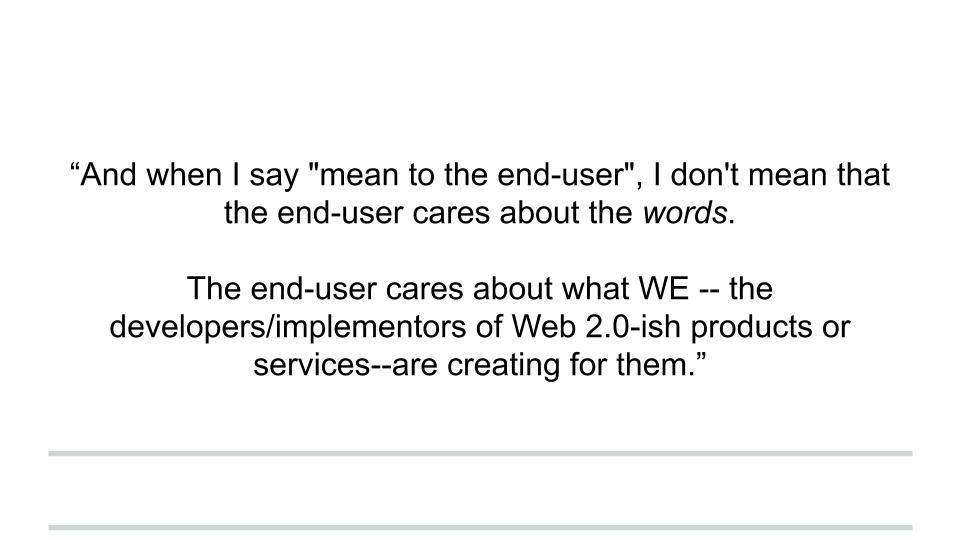buzzword bingo
But we also exist, I believe, to enable people to let go of their stories and their realities...

Last week at the Lab I volunteered to do a 3x10 talk. I spent about an hour revamping an Ignition talk I'd done back in 2014. This time with GIFs and to reframe it for our context, in the public service.
The presentation was then a complete fail, as I neglected to do the right thing and check the tech before my talk started - so I was a bit dark at myself, but decided to rework it into a blog post. Mainly because of all the effort I took in collating the GIFs.
I've left all the slides in, including one aimed a colleague, who had been giving me grief whilst I was working. As you'll see I did remove their name to protect their innocence identity.
The very next day I saw this tweet, and it reminded me again of how incredible Kathy's work was and remains.
Thinking a lot about how valuable and influential Kathy Sierra has been to tech, and how she was one of the earliest and most viciously attacked targets of structured harassment, and how all the people who’ve learned from her haven’t been able to stop all the harms she predicted.
— Anil Dash 🥭 (@anildash) June 6, 2019

I created this talk originally, aimed at teachers, asking them to reflect on some of their own biases and the language they choose to use as a result.
I think the talk still applies here in the SI Lab though. In part because one of the challenge as public servants is separating our professional roles and personal lives, but still holding true to both roles as honestly as possible.
Two questions I ask myself are:
"As a public servant how do the two roles of personal and professional both proscribe and prescribe my ability to do my job?"
"As a public servant, how will I be judged on my personal capacity and my professional capacity?"
Answering those questions requires constant reflection I think.

So this talk is about how we separate and balance these roles. To do so I want to look at how we describe those roles, and the nature of language we use when explaining our roles to others.
What words do we use to describe what we do, and how we do.
What words define us and place us in the wider public sector.
What words separate us from others in the public sector and those we serve.
Some of you may be aware of David Shing - otherwise known as @shingy - the self-styled digital prophet, who was at AOL, now at Verizon - he fills big conferences with phrases like this:
“I’m an artist… For your digital palettes I want you to think about three colours: Technology, content, distribution.”
He brings a lot of buzzwords to the table.
What are the buzzwords in our space ?
In public sector. In design. In service delivery. In innovation.
What are the words you mentally eye-roll about when you hear them used?

Because this is is what we need to be considering in our conversations and in the words we choose .
This graphic, and the key thoughts in this talk are from from a post that Kathy Sierra wrote in 2005. It’s on her blog Creating Passionate Users.
Kathy stopped, and walked away from the Web in about 2007, after death threats against her. That’s before Twitter and most social media platforms, and in the time of Web 2.0 - but so much of her works is still really relevant as a framer.
This is what I try to do in my conversations - in the engagement I do with agencies and people in them.
Most of the people I meet are in the bottom left hand corner - they’re getting used to the lexicon - to the words that we use in the Lab. And so we have to be deliberate.
There’s a real challenge inherent in how we have conversations - because the upper right of this visual is a fun place to be - it’s sexy - it makes us feel good. It’s where we want to be.
And sometimes it’s easy to present to those people in that way - because they’re coming to us as the "experts" right? We want to be the experts. There’s kudos there, in being an expert.
But how effective are the conversations we need to have - when we talk like we’re in that upper right hand, if the people we’re in conversation with are in the lower left in regards to the language they use and are comfortable with?

There’s nothing wrong with using domain specific words - to bring clarity and deliberateness to our conversations. To ensure we’re all on the same page - talking about the same thing.
But it’s very easy to use buzzwords to shortcut the effort required to build the expertise required to use those domain specific words.
In my space - I have to be very careful about phrases like agile/sprint/service design - because they mean so many different things to different people. And then think of all the domain specific words we use in public sector land - memo/A3/#insertwhateveracronym you can remember here.
That’s I think why people want to come to the tours of the Lab space - because there's lots of words used to describe this place. Some domain specific. Some buzzwords. We need to keep sharing the story, with words that provide meaning for them, in the ways that they can make sense of.
Domain-specific terms are usually associated with passion, or at least expertise, so how do we show that passion?
How do we show that expertise in meaningful ways - to the people we’re working with?
Because buzzwords are often associated with those who might be faking expertise, or who are using them simply to impress others.
I think it's really easy to be a Shingy in our space - because we are by definition different to other public sector spaces. But we can’t let that go to our heads, or be seen as experts because we use buzzwords.
“Among other things, a shared vocabulary helps experts and professionals get a message across more quickly.
But it also helps build their passion. Just figuring out the commonly-used phrases, words, names, stories, etc. are part of what gives people a sense of belonging.
A sense of being a part of something special. A sense of having learned--and earned--their way in. So in this case, exclusionary isn't necessarily a bad thing.”
That’s Kathy’s quote - and I like it because it speaks to the way we can be more than just buzzwords or domain-specific users of words - it speaks to how we can create a conversation that supports and serves agencies and individuals. There is tension there - but also opportunity - if we recognize it and share the responsibility.
So we need to build that shared language in a way that it's useful across our teams internally
And we need to recognise that each agency or individual has a different space and understanding of language we’re using - so we need to have constant conversations to align those.
That will and does take time. And that sense of learning and earning is hugely empowering - to agencies and to individuals. We need to honour that time and effort as we serve agencies.
“And my problem is not that they are too complex and should be dumbed down.
My problem is that they are focused on the technology and the business model, rather than focusing on what those things will mean to the end-user. “
Kathy’s words - again, written in 2005, but still relevant today - because many of the solutions in the public sector can be derived by, or led by a technology and business model focus.
That at times does lose sight of the end-user.
That speaks to one of challenge for us as the Service Innovation Lab. Namely, how do we ensure we navigate through the tech and biz models that do exist in the public sector and hold them to focusing and designing services for citizens and tangata whenua.
In and of themselves these models aren’t "broken or bad" though. It's just that we can’t discount them - strategically or tactically, and we need to be aware of them - speak to them and continue to focus on the needs of humans.
Also, and I think this can be hard in a personal way - those models might ultimately “win” in an agency, and the thing that I hold to is that ultimately those agencies are responsible for delivering the services themselves - so we just need to keep engaging in good faith, to keep looking for opportunities to prove the value of working differently together, and always seeking to hold the needs of human beings at the heart of what we do.

Kathy’s quote again.
And I think sometimes it’s easy miss this - in our efforts to prove our worth, to prove the value proposition of the SI Lab - of this different way of working.
It’s not the words that matter.
It really isn’t.
This slide is for ___________ who told me I was using too much text.

I want to finish with a quote that I’ve often referenced in my own personal development, that I like because I think it aligns with what we are as capable of doing as the Lab.
Yes, we exist with designers and developers and emerging tech.
Yes, we exist to serve agencies and uplift capability across the public sector.
But we also exist, I believe, at the heart of it - to enable people to let go of their stories and their realities, and with humility and deliberateness, empower them to figure out and create new and better ones.
For each other.
For citizens and tangata whenua.
For Aotearoa.
